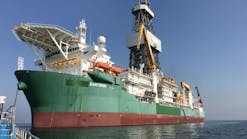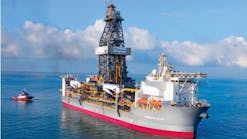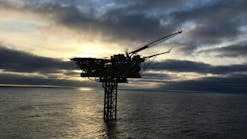Nigeria may offer 16 of these deepwater blocks for licensing as early as this month. This potential offering has attracted the eye of operators around the world.
The much-discussed bid offering for the newly carved deepwater leases offshore Nigeria has been postponed from September 1999 to the new year. The exact date of the opening rounds has not been set by the government. Since the Nigerian government announced the annulment of 16 ultra-deepwater licenses, granted between January 1 and May 29, 1999, operators have awaited a possible bid round on the areas. As of this writing, the new date being speculated was in February 2000.
Two companies benefitting from the frenzy have been PGS and Veritas DGC, both of whom have acquired non-exclusive speculative data in most of the Nigerian ultra-deep offshore. Apart from such majors as ExxonMobil, Shell, Agip, Texaco, Elf, Conoco, and Statoil already operating in deepwater in Nigeria, independents from the United States, Canada, France, and South Africa have expressed interest, including Canadian Occidental, Energy Africa, Sasol, Petrobras, and TotalFina. In addition, Chevron, which has had no operatorship on any block, is also particularly keen.
Gulf of Guinea
The Nigerian deepwater is one of the two major segments of an important exploration zone. The deepwater fairway off the coast of West Africa, otherwise known as the Gulf of Guinea, is one of the more interesting global hydrocarbon provinces. The fairway stretches from Côte d'Ivoire in the west to Angola in the south, with 12 states holding proven reserves of 33 billion bbl of oil and almost 140,000 bcf of gas.
Oil production has almost doubled, from 1.8 million b/d in 1983 to 3.7 million b/d in 1998. Several studies indicate that the 33 billion bbl proven reserves are just a fraction of the region's potential. There have been a series of deepwater discoveries off the northern coast of Angola over the last three years, and this area has become the flagship province of this prolific fairway.
In 1998, the Gulf of Guinea was the only hydrocarbon province in the world that yielded new discoveries. This has been largely due to Angola and Nigeria. Angola retained its 1997 position as the country with the largest increase in oil resources added through new discoveries - 2.3 billion in 1998. Nigeria was second on the new discoveries chart with 1.2 billion, all added from its deep aquatory.
Oil production in deepwater Angola began one week before Christmas, when Chevron started production of oil in Kuito with a floating production, storage, and offloading vessel. In the same week, Nigeria approved Shell's $2.7 billion development of the Bonga Field in deep offshore Delta OPL 212. First production is expected in the second quarter of 2003, peaking at 200,000 b/d and 150,000 MMcf/d of gas in 2004. Bonga (unofficially) boasts 500-600 million bbl reserves. The two projects reveal how far the deepwater activities are in these two leading producers in the Gulf of Guinea. Nigeria is simply trailing Angola.
Eye on Nigeria
Whereas the majors have been rushing to Angola, they have kept a close eye on Nigeria. In the last three months, the bid offerings in Angola have slowed down, signaling some sort of off-season period for open bidding. Meanwhile, Nigeria is becoming more important.
The last open bidding round for oil leases in Nigeria was conducted between 1991 and 1992. Between 1994 and 1999, Nigeria's military junta had granted lease awards on a discretionary-only basis to indigenous companies. The 16 licenses, which were annulled by the civilian government, were the last of a series of discretionary awards to be made by the military government before its departure.
All the licenses went to companies owned by military officers in the ruling junta. The new government, which came into office last May proposes to review the five year-old indigenization policy guideline which restricts award of oil blocks to indigenous entrepreneurs. The government is said to have been troubled by the influence of the indigenous operators, and has expressed concern that indigenous companies, lacking capital to finance investment in deepwater, might corrupt the process. After some pressure, the government has agreed to allow indigenous companies to bid for the leases, on the condition that they "have a valid working pact with acceptable technical partners."
Draft guidelines
A draft guideline being worked out by Nigeria's Department of Petroleum Resources (DPR), the industry's regulatory body, will require such companies to submit joint bids with their foreign technical partners. Informed sources say the bidding will likely begin in February or possibly March, but there has been no official word as of yet.
Other conditions for the bidding, according to sources, include payment of a non-refundable fee of N50,000 and a pro forma tender of $10,000 for the initial oil prospecting license. The prospective licensees also are required to pay $50,000 to enable them access relevant seismic data on deepwater and ultra-deepwater offshore blocks.






